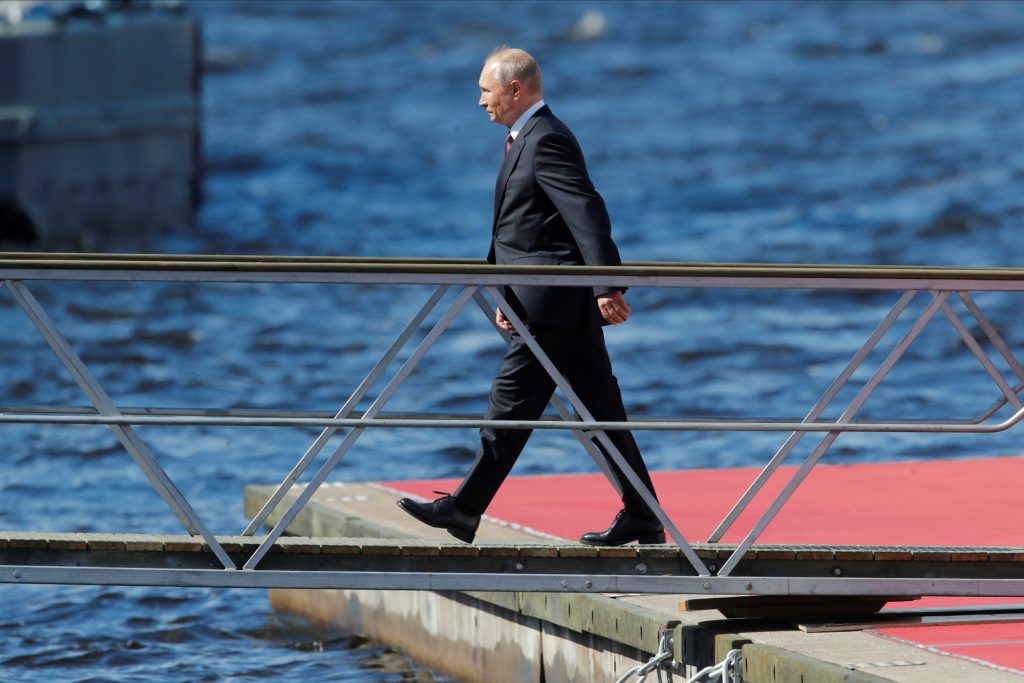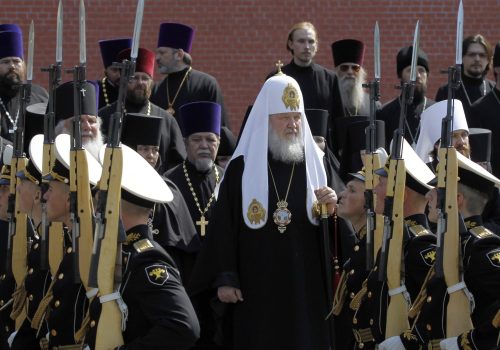On July 17, Russia withdrew from the UN-brokered Black Sea Grain Initiative, striking a devastating blow to Ukraine’s economy and undermining global food security. Yet the grain shutoff is just one symptom of a much broader strategic problem. The bigger issue is that Moscow is well on its way to turning the Black Sea, which is shared by seven countries, into a Russian lake.
Allowing Putin to get away with this will have disastrous consequences for the entire region, not only for Ukraine. Ben Hodges, the former commander of US forces in Europe, has it right: “The future of the West may be decided on the Black Sea and Washington isn’t prepared. We must get in the game.”
There can be no mistaking Russia’s intentions. Moscow is determined to cut off Ukraine’s access to world markets, and aims to assert its own dominance over the entire Black Sea region. For the past few weeks, Russian forces have been staging airstrikes on granaries in Ukraine’s main port city of Odesa, as well as ports on the Danube River that serve as Ukraine’s most important alternate export route. One of these Danube attacks came perilously close to NATO member Romania.
Meanwhile, Russia continues to export large amounts of grain and fertilizer from its own Black Sea ports to the outside world, often using trickery to evade sanctions. To keep this going, Putin is determined to bully and intimidate the other countries who share the Black Sea.
Stay updated
As the world watches the Russian invasion of Ukraine unfold, UkraineAlert delivers the best Atlantic Council expert insight and analysis on Ukraine twice a week directly to your inbox.
The US and its allies are admittedly limited in what actions they can take. Turkey, which controls access through the Bosphorus according to the 1936 Montreux Convention, has barred foreign warships from entering the Black Sea since the Russians launched the full-scale invasion of Ukraine in February 2022. That leaves Bulgaria, Romania, and Turkey itself as the only NATO members operating naval vessels in the Black Sea. But NATO has continued to fly into international airspace above the sea, on several occasions resulting in confrontations with Russian aircraft.
There are several ways the West can push back against Russian efforts to dominate the Black Sea. First of all, it can provide Ukraine with additional military resources to even out the odds. This could include beefing up anti-aircraft defenses around Odesa and other port cities to fend off Russian missiles.
US President Joe Biden should also send Kyiv sufficient numbers of anti-ship missiles to allow Ukraine to target Russian-controlled Black Sea ports on Ukrainian territory including Crimea. That would have the welcome side effect of raising international insurance costs for Russian vessels. In recent weeks, Ukraine has already shown itself capable of striking fear into the hearts of the Russian navy with its seagoing drones. The Ukrainian military could do much more with an ample supply of anti-ship missiles.
Financial and logistical assistance, smartly administered, can also go a long way. Ukrainian grain traders have told me that $200-300 million in insurance from the United States International Development Finance Corporation could help them to cover damage from future strikes.
Eurasia Center events

Meanwhile, Brussels should intensify its efforts to counter the current ban on Ukrainian grain imposed by five European Union countries whose farmers feel threatened by cheaper exports from their neighbor to the east. It’s doable but politically hard, especially with Poland’s upcoming elections.
Another small but potentially helpful measure would be to accelerate European Union funded upgrades to the port in Alexandroupolis, Greece, where up to 200,000 tons of grain exports per month could eventually be stored. Ukraine could send its grain there via Bulgaria and Romania.
All these proposals point to a larger issue: Coming up with effective answers to Russia’s control of the Black Sea requires formulating a comprehensive strategy for the entire region. The Russian grain blockade of 2023 was entirely predictable, yet the US and the European Union somehow failed to plan ahead for it, or to anticipate that Moscow would have the chutzpah to attack the alternative Danube route.
Some policymakers have noticed this lack of foresight. A bill stipulating the creation of just such a Black Sea strategy is currently making its way through the Foreign Relations Committee of the US Senate. However, similar plans have been in the works before without leading anywhere. Perhaps it’s time for President Biden and some leading Republicans to get together and move things ahead toward a coherent Black Sea strategy. Ukraine can’t afford more dithering.
Melinda Haring is the senior community engagement advisor at Razom for Ukraine and a non-resident senior fellow at the Atlantic Council.
Further reading
The views expressed in UkraineAlert are solely those of the authors and do not necessarily reflect the views of the Atlantic Council, its staff, or its supporters.

The Eurasia Center’s mission is to enhance transatlantic cooperation in promoting stability, democratic values and prosperity in Eurasia, from Eastern Europe and Turkey in the West to the Caucasus, Russia and Central Asia in the East.
Follow us on social media
and support our work
Image: Russia's President Vladimir Putin arrives to attend the Navy Day parade. July 26, 2020. (Dmitri Lovetsky/Pool via REUTERS)




